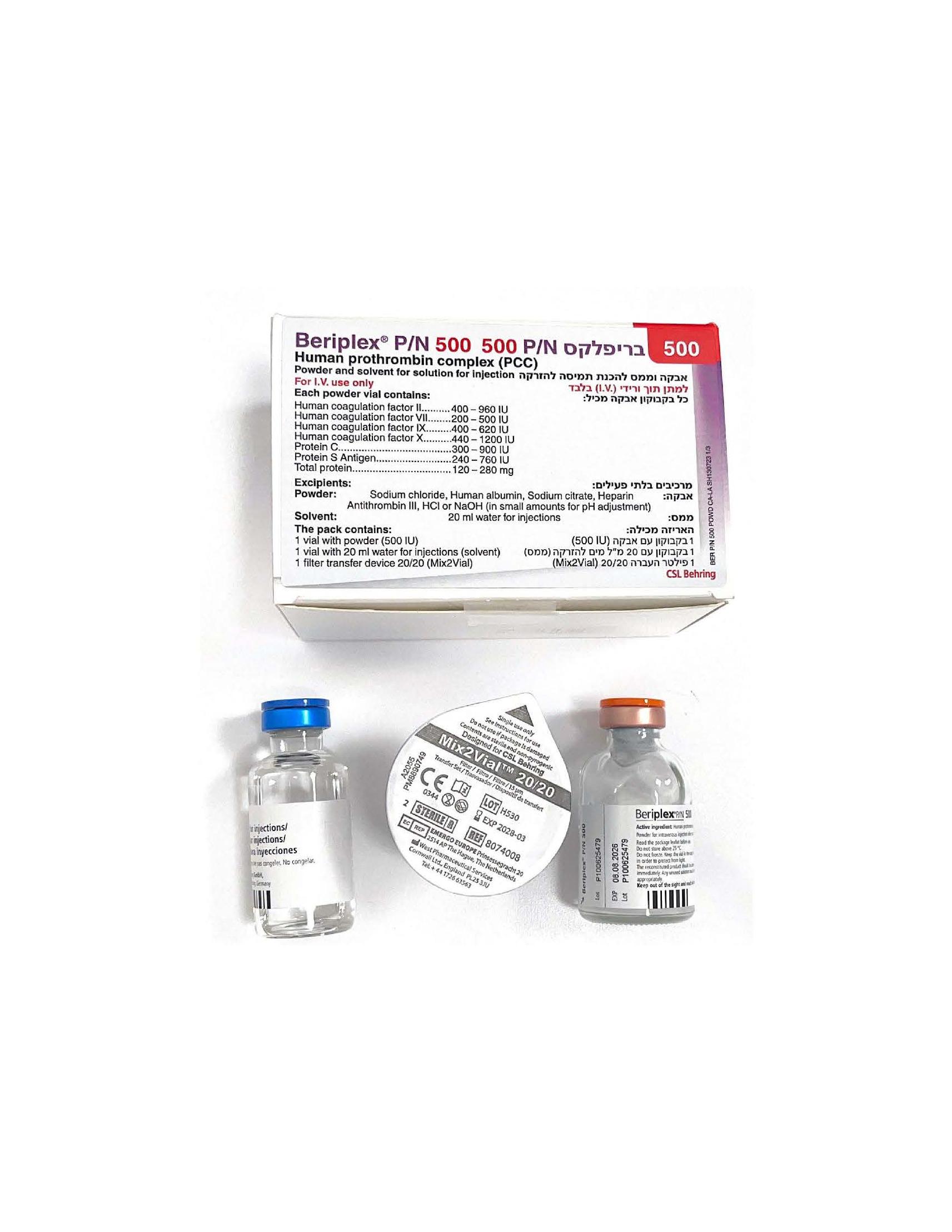Quest for the right Drug

בריפלקס P/N 500 BERIPLEX ® P/N 500 (COAGULATION FACTOR II (HUMAN), COAGULATION FACTOR IX (HUMAN), COAGULATION FACTOR IX (HUMAN- RFIXFC), COAGULATION FACTOR VII (HUMAN), COAGULATION FACTOR X (HUMAN), PROTEIN C, PROTEIN S ANTIGEN)
תרופה במרשם
תרופה בסל
נרקוטיקה
ציטוטוקסיקה
צורת מתן:
תוך-ורידי : I.V
צורת מינון:
אבקה וממס להכנת תמיסה להזרקה : POWDER AND SOLVENT FOR SOLUTION FOR INJECTION
עלון לרופא
מינוניםPosology התוויות
Indications תופעות לוואי
Adverse reactions התוויות נגד
Contraindications אינטראקציות
Interactions מינון יתר
Overdose הריון/הנקה
Pregnancy & Lactation אוכלוסיות מיוחדות
Special populations תכונות פרמקולוגיות
Pharmacological properties מידע רוקחי
Pharmaceutical particulars אזהרת שימוש
Special Warning עלון לרופא
Physicians Leaflet
Pharmacological properties : תכונות פרמקולוגיות
Pharmacodynamic Properties
5.1 Pharmacodynamic properties Pharmacotherapeutic group: antihaemorrhagics, blood coagulation factors II, VII, IX and X in combination ATC code: B02B D01 The coagulation factors II, VII, IX and X, which are synthesised in the liver with the help of vitamin K, are commonly called the prothrombin complex. In addition to the coagulation factors Beriplex contains the vitamin K dependent coagulation inhibitors Protein C and Protein S. Factor VII is the zymogen of the active serine protease factor VIIa by which the extrinsic pathway of blood coagulation is initiated. The tissue thromboplastin factor-factor VIIa complex activates coagulation factors IX and X, whereby factor IXa and Xa are formed. With further activation of the coagulation cascade, prothrombin (factor II) is activated and transformed to thrombin. By the action of thrombin, fibrinogen is converted to fibrin, which results in clot formation. The normal generation of thrombin is also of vital importance for platelet function as a part of the primary haemostasis. Isolated severe deficiency of factor VII leads to reduced thrombin formation and a bleeding tendency due to impaired fibrin formation and impaired primary haemostasis. Isolated deficiency of factor IX is one of the classical haemophilias (haemophilia B). Isolated deficiency of factor II or factor X is very rare but in severe form they cause a bleeding tendency similar to that seen in classical haemophilia. The further ingredients, the coagulation inhibitors Protein C and Protein S, are also synthesized in the liver. The biological activity of Protein C is enforced by the cofactor Protein S. Activated Protein C inhibits the coagulation by inactivating the coagulation factors Va and VIIIa. Protein S as cofactor of Protein C supports the inactivation of the coagulation. Protein C deficiency is associated with an increased risk of thrombosis. Acquired deficiency of the vitamin K-dependent coagulation factors occurs during treatment with vitamin K antagonists. If the deficiency becomes severe, a severe bleeding tendency results, characterised by retroperitoneal or cerebral bleeds rather than muscle and joint haemorrhage. Severe hepatic insufficiency also results in markedly reduced levels of the vitamin K-dependent coagulation factors and a clinical relevant bleeding tendency. However this is often complex due to a simultaneously ongoing low-grade intravascular coagulation, low platelet levels, deficiency of coagulation inhibitors and disturbed fibrinolysis. The administration of human prothrombin complex provides an increase in plasma levels of the vitamin K-dependent coagulation factors, and can temporarily correct the coagulation defect of patients with deficiency of one or several of these factors.
Pharmacokinetic Properties
5.2 Pharmacokinetic properties Pharmacokinetic and in-vivo recovery data were generated in a healthy volunteer study (N = 15) and in two studies in reversal of vitamin K antagonist treatment for acute major bleeding or perioperative prophylaxis of bleedings (N = 98, N = 43). Healthy Volunteer Study: 15 healthy volunteers were administered 50 IU/kg of Beriplex. The IVR is the increase in measurable factor levels in plasma (IU/ml) that may be expected following an infusion of factors (IU/kg) administered as a dose of Beriplex. Incremental IVRs for Factors II, VII, IX, X, and Proteins C and S were assessed. All maximum component levels occurred within the 3-hour time interval. Mean incremental IVRs ranged between 0.016 IU/ml for Factor IX and 0.028 for Protein C. Median plasma half-lives and incremental IVR are indicated as follows: Median plasma half-lives Incremental IVR Parameter (range)/hours (IU/ml per IU/kg b.w.) Geometric 90 % CI† Mean Factor II 60 (25 – 135) 0.022 (0.020 – 0.023) Factor VII 4 (2 – 9) 0.024 (0.023 – 0.026) Factor IX 17 (10 – 127) * 0.016 (0.014 – 0.018) Factor X 31 (17 – 44) 0.021 (0.020 – 0.023) Protein C 47 (9 – 122) * 0.028 (0.027 – 0.030) Protein S 49 (33 – 83) * 0.020 (0.018 – 0.021) † Confidence Interval * terminal half-life; two-compartment-model Beriplex is distributed and metabolized in the organism in the same way as the endogenous coagulation factors II, VII, IX and X. Intravenous administration means that the preparation is available immediately; bioavailability is proportional to the dose administered. Study in reversal of vitamin K antagonist treatment for acute major bleeding: The mean in-vivo recovery (IVR) was calculated in 98 subjects who received Beriplex for treatment of bleeding during vitamin K antagonist treatment. The incremental IVR responses ranged between 0.016 IU/ml for Factor VII and 0.019 IU/ml for Protein C. Study in reversal of vitamin K antagonist treatment for acute major bleeding or perioperative prophylaxis of bleeding: The mean in-vivo recovery (IVR) was calculated in 43 subjects who received Beriplex for treatment of bleeding or perioperative prophylaxis of bleedings during vitamin K antagonist treatment. The intravenous administration of 1 IU/kg Beriplex increased plasma levels of the vitamin K dependent coagulation factors ranging from 0.013 to 0.023 IU/ml.

שימוש לפי פנקס קופ''ח כללית 1994
לא צוין
תאריך הכללה מקורי בסל
לא צוין
הגבלות
לא צוין
מידע נוסף
